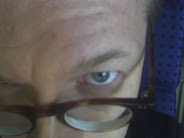Valuation.
If you take a look at this at Naked Capitalism, you can see what the problem is.
The core of the problem: valuations of assets in order to be able to determine the true status of those holding those assets.
Yves Smith and Tom Adams seem to be on the trail to something here, one in which the cover-up is worse than the actual crime. In order to avoid having to mark-to-market, the use of mark-to-model has been used (and indeed needed when there is no market because of the financial crisis). The problem that arises is that there is virtually no way to assess the models used when determining the book value (as opposed to actual value) of the assets involved.
Back in the old days, before mark-to-market, assets were valued at their purchase price minus depreciation plus investments into the asset. Plain and simple, worked. Of course, in a strong market upswing, these assets were, if anything, undervalued, which limited the degree to which companies could leverage their equity to generate greater debt.
Mark-to-market corrected that, but in doing so made things infinitely worse: what if there was no longer a market, due to a market meltdown? Then companies would have to reevaluate their assets and discount their holdings to nothing, even though there was no intent to sell or to wind the company down (indeed, following mark-to-market principles, many companies would have to be unwound if the market for their assets crashed, regardless of how these companies were actually doing: absolute and complete madness brought upon us by the accounting profession, which to this day continues to defend the idea.
Given that no one wanted to go back to the simple asset valuation method, mark-to-model was what people came up with: in this case, somebody makes a number up.
Sure, it's statistically based and there's some sort of asset valuation model there, but at the end of the day, it's synthetic, something that someone made up, rather than something that actually has a connect to reality.
What this is increasingly looking like - and in defense of those doing it, it appears to be motivated by desperation, rather than greed or criminal intent - is nothing less than fraud in and of itself: it is the misrepresentation of a thing to be something that it is not.
No one knows what literally trillions (nominal face value) of assets are really worth anymore, largely because of the idiocy of mark-to-market (and the accounting profession really doesn't seem to comprehend how extraordinarily destructive the mark-to-market philosophy really is: it is the driving force behind the financial chaos and economic crisis), but the Fed is actively supporting, in effect, making up numbers that kinda sorta make sense and could be close, in the interest of avoiding further collapse.
It's not so much the crime involved here - if this is the case, the Fed is involved in fraud - as the cover-up which will bring the whole house of cards down. Like those of Nixonian fame, there was never so much the decision to cover-up, but rather there was never the question that there wouldn't be.
Key quote:
The Fed seems awfully keen to steer clear of the fate that befell Lehman. Lehman was grossly and verifiably misvaluing some investments, namely Archstone and SunCal, that confirmed doubts about the veracity of its accounting. If you can't check any particular valuations, it's a lot harder to ask difficult questions. And unlike Lehman, the Fed can continue to account to no one.
The Fed is engaging in same practices that caused the crisis: failure to make timely disclosures, obfuscation, use of off balance sheet vehicles to distance itself from losses. This posture alone should disqualify the central bank from assuming a greater regulatory role.
The Fed and Treasury's three card monte operation is anti-democratic and possibly illegal, and to add insult to injury, voters are treated as if they have no right to know when they are ultimately footing the bill. The Fed's persistent stonewalling and deep seated hostility toward the public provide ample proof of the need for an audit.
The last report from the FBI on mortgage fraud that I could find on their website was from 2008. There doesn't seem to be much from any younger date...The Fed is apparently ensuring that no one can verify what assets are worth: this precludes the identification of mis-valuations. It may not quite be fraud, but covering-up so that no one can see if it is fraud or not is tantamount to the same damn thing.
It's not so much the crime as the cover-up.


Keine Kommentare:
Kommentar veröffentlichen